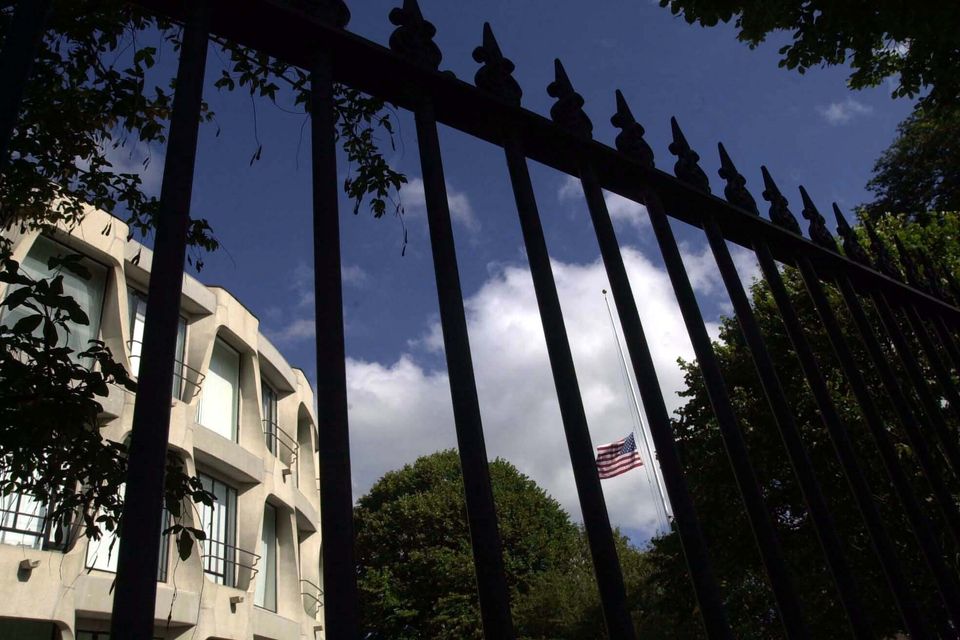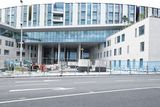‘I don’t approve of them, I don’t agree with them’ – Taoiseach says new US J1 visa rules around social media ‘excessive’
The American Embassy in Dublin has set out new rules (Haydn West/PA)
Taoiseach Micheál Martin has said new rules for students applying for J1 visas are "excessive".
Mr Martin was speaking ahead of his attendance World Conference on Tobacco Control, when he said he did not approve of the new measures, which will see a requirement for all social media accounts used in the past five years to be public to be vetted by US authorities.
The announcement was made by the US today and the changes are effective immediately.
Students applying for J1 visas must provide all social media accounts they have used in the past five years and make them public so they can be “thoroughly” vetted by US authorities.
"I believe those measures by the United States are excessive. I don't approve of them. I don't agree with them," Mr martin said.
While there was an issue in relation to freedom of speech, Mr Martin said it creates an atmosphere of fear and anxiety. The number of J1 applications are down this year, Mr Martin said.
"There is an issue around freedom of speech, but it's more the atmosphere that's created by these measures, the fear and the anxiety that young people will now experience travelling," the Taoiseach said.
Though Mr Martin said he understood the importance of security, he believed the newly announced measures went too far.
Irish students will have to undergo “comprehensive and thorough vetting” of their social media, the US Embassy has announced today.
“To facilitate this vetting, all applicants for F, M, and J non-immigrant visas will be instructed to adjust the privacy settings on all of their social media profiles to ‘public’.
“Visa applicants are required to list all social media user names or handles of every platform they have used from the last five years on the DS-160 visa application form.
We need your consent to load this Social Media content. We use a number of different Social Media outlets to manage extra content that can set cookies on your device and collect data about your activity.
“Applicants certify that the information in their visa application is true and correct before they sign and submit. Omitting social media information could lead to visa denial and ineligibility for future visas.”
Today's news in 90 Seconds - Monday June 23
The changes also apply for other exchange visitor applicants in the F, M, and J non-immigrant classifications.
All applicants are asked to list all their social media profiles, and make their accounts publicly accessible.
Failure to do so could lead to a visa being rejected.
The embassy said it would use all available information in its visa screening to identify those who would be “inadmissible” to the US, including those who posed a threat to national security.
In a statement on Monday, it said that a US visa was “a privilege, not a right”.
It said that it was protecting the US by upholding the highest standards of national security and public safety, adding: “Under new guidance, we will conduct a comprehensive and thorough vetting, including online presence, of all student and exchange visitor applicants in the F, M, and J non-immigrant classifications.
The US Embassy in Dublin will resume scheduling F, M, and J non-immigrant visa applications “soon”.
The embassy added: “Every visa adjudication is a national security decision. The United States must be vigilant during the visa issuance process to ensure that those applying for admission into the United States do not intend to harm Americans and our national interests, and that all applicants credibly establish their eligibility for the visa sought, including that they intend to engage in activities consistent with the terms for their admission.”
Bryan O’Mahony, deputy president of Aontas na Mac Léinn in Éirinn (AMLÉ) - formerly known as the Union of Students in Ireland (USI) - said: “Students should not be subjected to invasive scrutiny simply for seeking educational and cultural opportunities abroad.
“These changes create a climate of fear and self-censorship, and risk unfairly penalising students from marginalised or politically active communities.”
AMLÉ said it reiterates its call on the Irish Government to engage directly with US authorities to “advocate for the rights and dignity of Irish students seeking to study, work, or travel on a J1 visa.”
The union also warned that the policy may discourage participation in global learning and weaken trust in the international student visa system.
AMLÉ said it believes the measures “represent a significant and disproportionate intrusion into students' personal lives and digital privacy, and that they raise serious concerns about freedom of expression and online surveillance.”
Antoin O Lachtnain, from Digital Rights Ireland Limited, told the Irish Independent that students would now have to make the choice whether they wanted to allow such access to their personal data to travel to the US.
“This is why people have to be very careful about their privacy,” he added.
“The other side of this is the chilling effect of not allowing people to say what they want to say - that's the political problem with this policy.
“We all leave a digital trail. And unfortunately what people say and do on social media can go against them later. What the American Government is doing to profile J1 applicants is a blunt instrument but it gives a pointer for what the future could be like.”
Join the Irish Independent WhatsApp channel
Stay up to date with all the latest news















